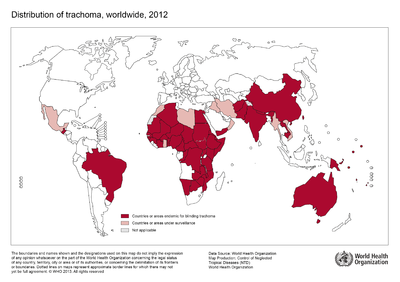Ocular Infection by Chlamydia trachomatis: Public Health Responses to Pathology: Difference between revisions
| Line 23: | Line 23: | ||
==Section 1== | ==Section 1== | ||
[[Image:Trachoma 2012 WHO .png|thumb|400px|right|The global distribution of ocular trachoma in 2012. Countries and geographic areas endemic for blinding trachoma shown in dark red, and areas under surveillance by the World Health Organization shown in pink. Image courtesy of WHO 2013. [http://gamapserver.who.int/mapLibrary/Files/Maps/Trachoma_2012.png ].]] | |||
Include some current research, with at least one figure showing data.<br> | Include some current research, with at least one figure showing data.<br> | ||
<br> | <br> | ||
Revision as of 22:04, 23 April 2016
Section

By Lydia Wolf
At right is a sample image insertion. It works for any image uploaded anywhere to MicrobeWiki.
The insertion code consists of:
Double brackets: [[
Filename: PHIL_1181_lores.jpg
Thumbnail status: |thumb|
Pixel size: |400px|
Placement on page: |right|
Legend/credit: World Health Organization. (2013). World Health Organization Map Production: Control of Neglected Tropical Diseases (NTD). [3].
Closed double brackets: ]]
Other examples:
Bold
Italic
Subscript: H2O
Superscript: Fe3+
Introduce the topic of your paper. What is your research question? What experiments have addressed your question? Applications for medicine and/or environment?
Sample citations: [1]
[2]
A citation code consists of a hyperlinked reference within "ref" begin and end codes.
Section 1

Include some current research, with at least one figure showing data.
Every point of information REQUIRES CITATION using the citation tool shown above.
Section 2
Include some current research, with at least one figure showing data.
Section 3
Include some current research, with at least one figure showing data.
Section 4
Conclusion
References
Authored for BIOL 238 Microbiology, taught by Joan Slonczewski, 2016, Kenyon College.
